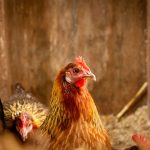Selecting the appropriate chicken breed is essential for successful poultry farming. Various breeds exist, each with distinct traits and requirements. Some breeds excel in egg production, while others are valued for meat quality.
When choosing a breed, it is crucial to consider specific goals and needs. For egg production, breeds such as Rhode Island Red and Leghorn are known for high yields. For meat production, Cornish Cross and Plymouth Rock breeds are popular due to their size and meat quality.
Climate and environmental factors also play a significant role in breed selection. Certain breeds are better adapted to cold climates, while others thrive in warmer conditions. Orpington and Wyandotte breeds, for instance, are known for their cold-hardiness and are suitable for colder regions.
Mediterranean breeds like Leghorn and Ancona are better suited to warmer climates. Considering these factors ensures the selection of a breed that will flourish in the specific environment and meet the intended purpose.
Table of Contents
- 1 Building a Suitable Coop
- 2 Feeding and Nutrition
- 3 Health and Hygiene
- 4 Egg Production
- 5 Handling and Care
- 6 Legal Requirements and Regulations
- 7 FAQs
- 7.1 What are the benefits of keeping chickens in Australia?
- 7.2 What are the legal requirements for keeping chickens in Australia?
- 7.3 What are the housing requirements for chickens in Australia?
- 7.4 What do chickens eat in Australia?
- 7.5 What are the common health issues for chickens in Australia?
- 7.6 What are the best chicken breeds for Australian climates?
Key Takeaways
- When choosing a breed, consider factors such as climate, space, and purpose (meat, eggs, or both).
- A suitable coop should provide enough space for the chickens to move around, roost, and lay eggs comfortably.
- Ensure a balanced diet for your chickens, including a mix of grains, protein, and calcium for egg production.
- Regularly clean the coop, provide fresh water, and monitor for signs of illness to maintain the health and hygiene of your chickens.
- Understand the factors that affect egg production, such as age, breed, and environmental conditions, to maximize yield.
Building a Suitable Coop
Size Matters
When building a coop, one of the most important factors to consider is the size of the coop. The general rule of thumb is to allow 2-3 square feet of space per chicken inside the coop, and 8-10 square feet of space per chicken in the outdoor run. This will ensure that your chickens have enough space to move around and engage in natural behaviors like scratching and dust bathing.
Design and Materials
In addition to size, it’s important to consider the materials and design of the coop. The coop should be sturdy and predator-proof, with secure latches and locks to keep out unwanted visitors. It should also provide adequate ventilation to prevent moisture buildup and ensure good air quality.
Essential Features
Nesting boxes should be provided for egg-laying, and roosting bars should be installed to give your chickens a place to perch at night. Finally, it’s important to consider the location of the coop. It should be placed in a well-drained area with good sun exposure, and it should be situated away from any potential sources of disturbance or danger.
By taking these factors into consideration, you can ensure that your chickens have a safe and comfortable home.
Feeding and Nutrition

Proper feeding and nutrition are essential for keeping your chickens healthy and productive. Chickens require a balanced diet that provides all the necessary nutrients for growth, egg production, and overall health. A good quality commercial feed is a great starting point for most flocks.
Look for a feed that is specifically formulated for laying hens if you are raising chickens for eggs, or a feed formulated for meat birds if you are raising chickens for meat. In addition to commercial feed, chickens also benefit from access to fresh greens, grains, and kitchen scraps. Providing a diverse diet will help ensure that your chickens get all the nutrients they need.
In addition to providing a balanced diet, it’s important to ensure that your chickens have access to clean water at all times. Chickens require a lot of water, especially when they are laying eggs, so it’s important to regularly check and refill their waterers. It’s also important to consider any additional supplements that may be necessary for your flock.
For example, if you notice that your chickens’ eggshells are thin or brittle, they may benefit from a calcium supplement. Similarly, if you notice any signs of nutritional deficiencies or health issues in your flock, it’s important to consult with a veterinarian or poultry nutritionist to determine the best course of action.
Health and Hygiene
Maintaining good health and hygiene practices is essential for keeping your chickens happy and healthy. Regularly cleaning the coop is an important part of maintaining good hygiene. This includes removing soiled bedding, cleaning out nesting boxes, and regularly scrubbing down surfaces with a poultry-safe disinfectant.
It’s also important to regularly check for signs of pests or parasites, such as mites or lice, and take appropriate measures to control them if necessary. In addition to good hygiene practices, it’s important to monitor your flock for signs of illness or injury. Common signs of illness in chickens include lethargy, decreased appetite, abnormal droppings, respiratory issues, or changes in behavior.
If you notice any of these signs in your flock, it’s important to consult with a veterinarian who specializes in poultry health. Regular health checks and vaccinations can also help prevent common diseases and keep your flock healthy.
Egg Production
If you’re raising chickens for eggs, maximizing egg production is likely one of your primary goals. There are several factors that can impact egg production in chickens. First and foremost, providing a balanced diet with adequate nutrition is essential for supporting healthy egg production.
In addition to nutrition, providing a comfortable and stress-free environment is important for encouraging regular egg laying. This includes ensuring that your chickens have enough space, access to clean water, and protection from predators. It’s also important to consider the breed of chicken you are raising when it comes to egg production.
Some breeds are known for their high egg yields, while others may lay fewer eggs but are prized for other qualities such as meat production or cold-hardiness. By choosing a breed that is well-suited to egg production and providing the right environment and nutrition, you can help maximize egg production in your flock.
Handling and Care

Handling Chickens with Care
When handling chickens, it’s important to be gentle and calm in order to minimize stress on the birds. It’s also important to handle chickens regularly from a young age in order to acclimate them to human interaction.
Regular Care for a Healthy Flock
Regular handling can help make chickens more tame and easier to manage. In addition to handling, regular care is essential for maintaining good health in your flock. This includes regular health checks, grooming (such as nail trimming), and monitoring for signs of illness or injury.
Preventing Boredom and Stress
It’s also important to provide enrichment activities for your chickens in order to keep them mentally stimulated and prevent boredom.
Legal Requirements and Regulations
Before starting a chicken flock, it’s important to familiarize yourself with any legal requirements and regulations that may apply in your area. This can include zoning laws, permits, or restrictions on the number of chickens allowed on your property. It’s also important to consider any local ordinances related to noise or waste management that may impact your ability to raise chickens.
In addition to local regulations, it’s also important to consider any federal or state regulations that may apply to raising chickens. This can include regulations related to food safety, animal welfare, or biosecurity measures aimed at preventing the spread of disease. By familiarizing yourself with these regulations and ensuring that you are in compliance with all applicable laws, you can avoid potential legal issues and ensure that your chicken flock is being raised responsibly.
In conclusion, raising chickens can be a rewarding experience that provides fresh eggs, meat, and companionship. By carefully considering factors such as breed selection, coop design, feeding and nutrition, health and hygiene practices, egg production, handling and care, and legal requirements and regulations, you can set yourself up for success as a chicken owner. With proper planning and attention to detail, you can create a safe and comfortable environment for your flock while ensuring that you are in compliance with all applicable laws and regulations.
Whether you’re new to raising chickens or have years of experience under your belt, there is always something new to learn about best practices for raising happy and healthy chickens.
If you’re looking for more tips on keeping chickens in Australia, you might want to check out this article on how to insulate a chicken coop. It provides valuable information on how to keep your chickens warm during the colder months, which is especially important in the Australian climate.
FAQs
What are the benefits of keeping chickens in Australia?
Keeping chickens in Australia can provide a sustainable source of fresh eggs, natural pest control in the garden, and a source of organic fertilizer for the soil.
What are the legal requirements for keeping chickens in Australia?
The legal requirements for keeping chickens in Australia vary by state and local council. Generally, there are regulations regarding the number of chickens allowed, coop size, and distance from neighboring properties. It is important to check with local authorities for specific regulations.
What are the housing requirements for chickens in Australia?
Chickens in Australia require a secure and predator-proof coop with adequate space for nesting, perching, and roosting. The coop should also provide protection from extreme weather conditions.
What do chickens eat in Australia?
Chickens in Australia can be fed a diet of commercial chicken feed, supplemented with kitchen scraps, grains, and greens. It is important to provide a balanced diet to ensure the health and productivity of the chickens.
What are the common health issues for chickens in Australia?
Common health issues for chickens in Australia include mites, lice, respiratory infections, and egg-laying problems. Regular health checks and proper hygiene practices can help prevent these issues.
What are the best chicken breeds for Australian climates?
Some chicken breeds that are well-suited to Australian climates include Australorp, Isa Brown, and Sussex. These breeds are known for their ability to tolerate heat and cold, and for their egg-laying capabilities.
Meet Walter, the feathered-friend fanatic of Florida! Nestled in the sunshine state, Walter struts through life with his feathered companions, clucking his way to happiness. With a coop that’s fancier than a five-star hotel, he’s the Don Juan of the chicken world. When he’s not teaching his hens to do the cha-cha, you’ll find him in a heated debate with his prized rooster, Sir Clucks-a-Lot. Walter’s poultry passion is no yolk; he’s the sunny-side-up guy you never knew you needed in your flock of friends!







